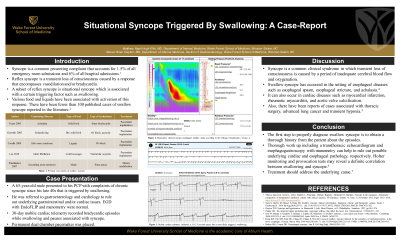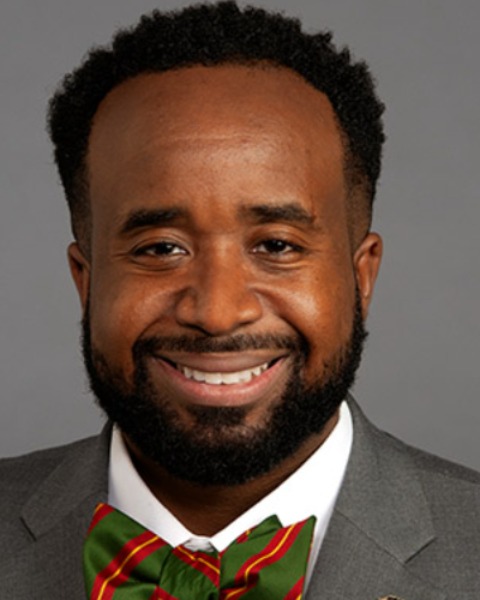Sunday Poster Session
Category: Esophagus
P0458 - Situational Syncope Triggered by Swallowing: A Case-Report
Sunday, October 22, 2023
3:30 PM - 7:00 PM PT
Location: Exhibit Hall

Has Audio

Matthew Ellis, MD
Wake Forest University School of Medicine
Winston-Salem, NC
Presenting Author(s)
Matthew Ellis, MD, Steven Clayton, MD
Wake Forest University School of Medicine, Winston-Salem, NC
Introduction: Syncope is a common presenting complaint that accounts for 1.5% of all emergency room admissions and 6% of all hospital admissions. Reflex syncope is a transient loss of consciousness caused by a response that encompasses vasodilation and/or bradycardia, leading to systemic hypotension and cerebral hypoperfusion. A subset of reflex syncope is situational syncope - syncope that is associated with a certain triggering factor such as swallowing that activates a neural reflex, which is known as swallow syncope. Swallow syncope entails the automatic nervous system response of the esophagus and heart via the vagus nerve. Various food and liquids have been associated with activation of this response. There have been fewer than 100 published cases of swallow syncope reported in the literature. We present a rare case of chronic syncope in the absence of cardiac or esophageal pathology.
Case Description/Methods: A 65-year-old Caucasian male with a medical history of pericarditis, chronic atrial fibrillation (on Eliquis), essential hypertension, and nonobstructive CAD contacts his primary care provider with complaints of chronic syncope. Since his late 40s, the patient has been experiencing episodes of “fainting” that is triggered by swallowing. Individuals observing these episodes witness the patient losing muscle control and falling. He does not regain consciousness for a few seconds. The patient’s PCP referred him to a gastroenterologist who conducted multiple labs and tests. A referral was also sent to cardiology to rule out any underlying cardiac issue. Cardiology ruled out any cardiac etiology with Tilt table test. They placed a 30-day mobile telemetry, and it recorded bradycardic episodes while swallowing and showed pauses associated with syncope or presyncope which were consistent with his typical episodes.
Discussion: Syncope is a common clinical syndrome in which transient loss of consciousness (TLOC) is caused by a period of inadequate cerebral blood flow and oxygenation. It is important to identify but often difficult to diagnose. Reflex syncope is one of the etiological categories of syncope, and swallow syncope, included in this category, is a relatively rare syndrome. It seems to occur in adult males most often. Swallow syncope has occurred in the setting of esophageal diseases such as esophageal spasm, esophageal stricture, and achalasia. There have been cases that were reported to be associated with thoracic surgery, advanced lung cancer and transient hypoxia.
Disclosures:
Matthew Ellis, MD, Steven Clayton, MD. P0458 - Situational Syncope Triggered by Swallowing: A Case-Report, ACG 2023 Annual Scientific Meeting Abstracts. Vancouver, BC, Canada: American College of Gastroenterology.
Wake Forest University School of Medicine, Winston-Salem, NC
Introduction: Syncope is a common presenting complaint that accounts for 1.5% of all emergency room admissions and 6% of all hospital admissions. Reflex syncope is a transient loss of consciousness caused by a response that encompasses vasodilation and/or bradycardia, leading to systemic hypotension and cerebral hypoperfusion. A subset of reflex syncope is situational syncope - syncope that is associated with a certain triggering factor such as swallowing that activates a neural reflex, which is known as swallow syncope. Swallow syncope entails the automatic nervous system response of the esophagus and heart via the vagus nerve. Various food and liquids have been associated with activation of this response. There have been fewer than 100 published cases of swallow syncope reported in the literature. We present a rare case of chronic syncope in the absence of cardiac or esophageal pathology.
Case Description/Methods: A 65-year-old Caucasian male with a medical history of pericarditis, chronic atrial fibrillation (on Eliquis), essential hypertension, and nonobstructive CAD contacts his primary care provider with complaints of chronic syncope. Since his late 40s, the patient has been experiencing episodes of “fainting” that is triggered by swallowing. Individuals observing these episodes witness the patient losing muscle control and falling. He does not regain consciousness for a few seconds. The patient’s PCP referred him to a gastroenterologist who conducted multiple labs and tests. A referral was also sent to cardiology to rule out any underlying cardiac issue. Cardiology ruled out any cardiac etiology with Tilt table test. They placed a 30-day mobile telemetry, and it recorded bradycardic episodes while swallowing and showed pauses associated with syncope or presyncope which were consistent with his typical episodes.
Discussion: Syncope is a common clinical syndrome in which transient loss of consciousness (TLOC) is caused by a period of inadequate cerebral blood flow and oxygenation. It is important to identify but often difficult to diagnose. Reflex syncope is one of the etiological categories of syncope, and swallow syncope, included in this category, is a relatively rare syndrome. It seems to occur in adult males most often. Swallow syncope has occurred in the setting of esophageal diseases such as esophageal spasm, esophageal stricture, and achalasia. There have been cases that were reported to be associated with thoracic surgery, advanced lung cancer and transient hypoxia.
Disclosures:
Matthew Ellis indicated no relevant financial relationships.
Steven Clayton indicated no relevant financial relationships.
Matthew Ellis, MD, Steven Clayton, MD. P0458 - Situational Syncope Triggered by Swallowing: A Case-Report, ACG 2023 Annual Scientific Meeting Abstracts. Vancouver, BC, Canada: American College of Gastroenterology.
